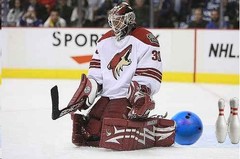

timeel39
Member-
Content Count
10 -
Joined
-
Last visited
About timeel39
-
Rank
Draftee
-
-
-
Here's some scouting on the competition...
- 322 replies
-
- photoshop war
- 2011
-
(and 1 more)
Tagged with:
-
On March 17, 2010, I wrote this essay for my English class. We had to write a research paper, so I chose Marty Turco losing his mojo. I explained what happened, and why. And I think it's pretty clear now that his mojo's pretty far gone. When Marty Lost his Mojo Marty Turco, goaltender of the Dallas Stars, once had mojo. Awarded the Roger Crozier Saving Grace award twice for having the best save percentage (number of saves divided by number of shots against) in the National Hockey League, Marty Turco was an All-Star performer; four times, actually. Drafted by the Dallas Stars straight out of high school in 1994, Turco opted not to play in the NHL, but rather decided to go to college. He played for the University of Michigan through 1999, and then the Stars placed him in the minor leagues. The Stars won the Stanley Cup in 1999 with goaltender Ed Belfour, and two years later added Marty Turco to its roster as a backup. He played two seasons as backup, collecting a save percentage of 92.2%.The Dallas Stars then bolstered the goaltender to a starting position, and Marty Turco had achieved his lifelong dream. Turco guided his team into the playoffs, and the Stars was definitely a contender. Finishing fifth place in its conference, the Stars played the Anaheim Ducks. Upon fighting past it in six games, the Stars moved on to the conference semifinals against the San Jose Sharks. In six more games, it moved on the Western Conference Finals to play the Detroit Red Wings, which finished first in the league. Marty Turco, once an All-Star goaltender in the National Hockey League lost his mojo on May 12, 2008 at 9:23 p.m. CDT due to Pavel Datsyuk’s hat trick; this lack of mojo is apparent in his statistics, his attitude in interviews, and how others are talking of him. Before one can examine the events that took place on May 12, 2008, one must first understand what mojo is. It is defined as either magic charms and spells or personal magnetism and charm; in hockey jargon, it takes on an odd combination of both entries. “Mojo” can be defined in hockey as when a player has it going for them, when they feel comfortable and calm: quicker reflexes, lucky bounces, and a drive that makes them faster than the next person. Someone with mojo makes headlines, scores goals (or miraculously stops them), and burns records. Any player’s performance can be calibrated by comparing their raw talent to the mojo they possess; some players have traceable periods of having mojo and not, some have sudden three-week bursts now and then, and there are players like Marty: he had it for years, stacking upon his talent, until one day it was gone. It is unseen yet if Marty Turco will regain it at any time, but it is clear that he lost it anyway. Marty Turco still has his talent, but that can really only make up half of one’s performance. Before the disappearance of Marty’s mojo can be proven, it is important to understand that he had it in the first place. Before the game in question, Marty Turco had a save percentage in the playoffs of 93%. In the game in question, however, his save percentage was 76% (NHL Stats). In addition to his playoff performance before the game, he was stunning in the regular season. On April 28, 2008, Sports Illustrated labeled Turco as “superb in the regular season,” and praised his performance in the first round of the playoffs. Citing his play against the Anaheim Ducks, the magazine declared Turco “hot” in terms of his play, and supported the goaltender in the playoff race (Sports Illustrated). Even before the playoffs, though, and even before the season, Turco’s mojo was omnipresent and omnipotent. At the University of Michigan, Marty Turco started for all four years. His goals against average was never below two for any season (a benchmark that sets a great goalie apart from a good one), but it was terribly close. With an average of 2.187 goals per game through college, it is hard to deny that Marty Turco was a top-rate goalie. In his first season in the NHL, he grew into an even better goaltender with an average of 1.90 goals per game (NHL Stats). Marty Turco really shone for the Stars, which regarded him as the front-runner of the team. It was not only the Stars organization that viewed Marty in this golden light, but 2K Sports did as well. 2K Sports, a prominent maker of sports video games, chose Marty Turco to be the cover player on its NHL 2K6 game, demonstrating the level he had risen to. In an interview Marty Turco did with IGN.com about the game, the webpage even called him “the man who will lead them [the Stars]” in terms of winning the Stanley Cup, the most coveted trophy in hockey. In addition to posing for the game’s cover, it chose Turco to design a main feature of the game. The company wanted Marty Turco to design the goalie interface, allowing people to play as the goalie. 2K Sports, a major corporation, choosing Marty Turco over every other goaltender to make the goalie feature not only shows trust in Turco, but also is a testament to his abilities (IGN.com). Kids would be able to play like Marty Turco in their homes, which used to be a good thing; that game changed it all. On May 12, the hockey game started just like any other. It was the third round of the playoffs, and the Stars were facing a potential 3-0 deficit in the series, something only overcome by one NHL team before them. Playoff hockey is, well, harder than regular season hockey, and it has been known to demoralize and destroy players, especially goaltenders. Especially goaltenders that played an excessive amount in the regular season. Marty Turco played more than usual in the regular season with 62 games played out of a total 82, but these are not ridiculous numbers; Evgeni Nabokov, goalie for the San Jose Sharks, played 77. However, his team was riding Turco’s back in the playoffs, which puts too much pressure on the goaltender. He was faltering; a fact shown by the team’s predicament going into the game, but his team still used him as a shield. However, in this game, the shots were held relatively low. Around 30 shots per team are expected in any given playoff game, but this game, the shots were 21-18, in favor of the Detroit Red Wings. Turco, though, had finally cracked, and it can be assumed that his mojo leaked out. He allowed five goals in the game, including a hat trick (three goals) by Pavel Datsyuk, which was the first one of Datsyuk’s career. He scored his third goal at 9:23 p.m., CDT (NHL Boxscore). It is hard for goaltenders when a player gets the first of anything against them, which could have broken down the mental mojo of Marty Turco; if no one else had allowed this player to do something, surely Turco should not have. With the anxiety of the hat trick eating away at Turco’s mojo, it did not help that it happened in the playoffs. His team was depending on him, and he was a 76%, hardly Stanley-Cup-winning numbers. This pressure shook his foundation, and Turco lost his mojo. He still had his talent, however, and attempted to thrive on only this. The Red Wings ended up sending the Stars home with no trophy. During the off-season (the period between seasons), the lack of play inhibited Turco to reveal that he no longer had his mojo. Once the season began, however, it became quite apparent. In the 2007-08 season, before he lost his mojo, Turco’s winning percentage was a 52%, which isn’t bad. However, in the 2008-09 season, in which Turco was severely overworked (he played 74 out of 82 games), his winning percentage was a mere 45%. This drop, which may seem inconsequential, really hurt his team. His goals against average moved up from a 2.31 to a 2.81, which, when compounded over 74 games, means an extra 63 goals in a season. Turco’s save percentage also took a hit, dropping from 90.9% to 89.8%. This fall also seems minor, but that is over one more goal per 100 shots he allowed, and he faced 450 more shots. Perhaps the biggest indicator, however, is the Stars’ record. The Stars, coming out off a 5th-place finish the year before, finished in 12th place. The Stars missed the playoffs by seven points, finishing with only 83 points; this is the lowest winning percentage a team can have without having a 50% (NHL Stats). Late in the season on March 26, a Dallas sports writer decided to rip into the goaltender. Calling him a disappointment, Mike Heika said that Turco “hasn’t delivered.” He cited the Stars’ terrible goals against average (25th in the league out of 30) and save percentage (29th in the league) in condemning Marty Turco (Mike Heika). Enough about what stats and other people say about him, let’s have Turco himself tell of his performance. In the Heika interview, Marty Turco said his play has been “spotty at best.” This is an understatement, but Turco understands this, as he claims this is “a terrible feeling for [himself].” Turco opted to give a shorter interview, and used words with a negative connotation, such as “spotty” and “terrible” (Mike Heika). This shows a mental lack of mojo even off the ice, as it is in sharp contrast with his interview in 2006 where the transcript could (and does) fill pages, and he goes as far as to brag about his goaltending (IGN.com). He feels ashamed, as stated, and does not appreciate the interview. The attitude he has shows a different mental state, one without mojo. He understands that he is not as good as he used to be, which is actually messing with his head in a way that prohibits the return of his mojo; his play today is labeled “cold” (The Hockey News). Marty Turco used to be on top, and hockey analysts once considered him a contender for the Stanley Cup. He was the leader of a first-rate team, but now the team is on a skid. Pavel Datsyuk’s hat trick ruined his psyche, and his mojo absence stands out in his stats, reviews, and interviews. Without his mojo, Turco is simply relying on his raw talent, which makes him no better than a second-rate goaltender; third-rate if that goalie has mojo. Marty Turco may have lost his mojo, but he is still at the top of some lists in the NHL today: most overtime losses, and third most penalty minutes; he is not expected to sign with the Stars for the 2010-11 season. This is why he's been sitting since early February. If only Chicago knew before they signed him....
-
If I'm watching a game that i recorded so it's not live, but it's the first time I'm watching it, and the game has already been completed, is it still bad luck to say things such as sh*tout or ov*rtime? I'm curious because I seem to watch a lot of not-live games and am wondering about etiquette. What do you guys think?
-
It's not the best, but it'll do...
-
Love these
- 459 replies
-
- photoshop war
- 2010
-
(and 1 more)
Tagged with:
-
This pretty much sums it up.
- 459 replies
-
- photoshop war
- 2010
-
(and 1 more)
Tagged with:
-
-
I found exclusive scouting pictures of Bryzgalov; I think this round might be easier than expected!
- 459 replies
-
- photoshop war
- 2010
-
(and 1 more)
Tagged with:
-

PS 2009 Round 1 Photoshop War: Columbus Blue Jackets
timeel39 replied to Matt's topic in Hall of Fame
The Versus Hockey Central analysts Keith Jones and Brian Engblom...- 687 replies
-
- photoshop war
- 2009
-
(and 1 more)
Tagged with:
-

PS 2009 Round 1 Photoshop War: Columbus Blue Jackets
timeel39 replied to Matt's topic in Hall of Fame
Here are some Mason ones I made- 687 replies
-
- photoshop war
- 2009
-
(and 1 more)
Tagged with:



